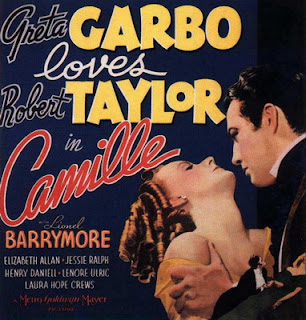Camille

Greta Garbo is is Madame Gautier, who grew up illiterate on a farm but has worked her way up in Paris society. She is known as "extravagant and insincere," and indeed does seem pretty fickle as she balances two romances. One is with the filthy rich and cold-hearted Baron (Henry Daniell), and with the much more humble and good-looking Robert Taylor. Whenever Taylor has convinced himself he's won her, something goes wrong and she ends up with the Baron. This makes Taylor pouty and petulant, and a real drip, so I had trouble rooting for them to be together.
All the while Garbo is suffering from tuberculosis, and manages to the right thing. A big scene with Lionel Barrymore, as Taylor's father, sees her giving Taylor up to protect his future (she is not a pure woman, after all). Garbo is great in this scene, putting aside her own self-interest for the sake of her true love, even if we in the modern age scoff at the situation.
The direction by Cukor, the "women's director," is sound, and there's some nice comic relief by actresses Lauren Crews Hope (later Aunt Pittipat in Gone With the Wind) and Lenore Ulric as Garbos' scheming rival. It never really connected with me, though, despite all the melodrama.


Comments
Post a Comment